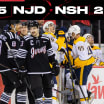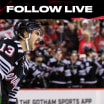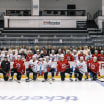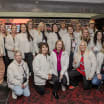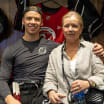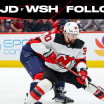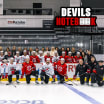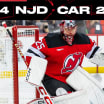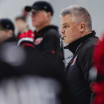Some folks still think Tom McVie didn't get it.
But, I did.
At the start of the 1983-84 season, I invited the gravel-voiced Devils coach to do a pre-campaign television chat with me for SportsChannel, which then broadcast New Jersey games.
Tom was delighted to appear and looked sharp in a new, trendy outfit as the camera rolled.
Both of us knew that the 1984 Entry Draft to be held the following June would be monumental in its effect on the next decade of big-league hockey.
Who would get the biggest-of-big draft prize: Mario Lemieux? That was the question. For sure, the Devils would be in the running.
When Winning Was Painful I STAN SPECIAL
Coach Tom McVie and the Devils refused to lose just to draft Mario Lemieux in the 1984 NHL Entry Draft
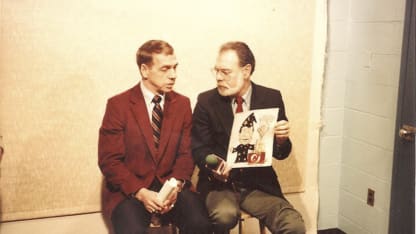
By
Stan Fischler
Special to NHL.com
With that in mind - and as an extra-added attraction for our TV segment - I invited my caricature-artist buddy, George Falkowski, on to the set to draw one of his fabled cartoons to fit the occasion.
Gorgeous George followed through with a humorous piece of artwork. It depicted McVie as a wizard, cooking up a special Devils winning potion.
"A generational player will be available," I told McVie. "Wouldn't it be something special if the Devils nabbed Mario Lemieux?"
McVie was both singularly unimpressed by the question and consummately obstinate with his answer. He interpreted what I had said as a double-dip insult - to his integrity and coaching ability.
"Forget about Lemieux," Tommy half-yelled, "we're not getting him. We're going to win more games, so forget it!"
The studio audience, which - in addition to artist Falkowski - also included a camera man and a couple of other tech guys.
Falkowski: "McVie's remarks caught all of us off guard. Granted, we all wanted to see the Devils be successful but, selfishly, who wouldn't want Mario skating at the arena and tormenting the Rangers and Islanders in particular for the next fifteen years?"
As the calendar would prove, Falkowski had made a pungent point.
Once the season began, McVie's handling of the team - vis-a-visThe Mario Effect - received considerable attention. In fact, Wayne Gretzky, himself, entered the picture; tangentially, of course.
That was the season when The Great One insulted the Devils by calling them "A Mickey Mouse Team." On Jan. 15, 1984, Gretzky and the Edmonton Oilers invaded The Meadowlands.
Although the mighty team from Alberta won the game, 5-4, the Devils played hard and well, proving that they were not going to win Lemieux in the 1984 draft by losing during the 1983-84 season.
"We'd like to prove to 20 other clubs that we're for real," McVie insisted, "and they're going to have to do everything they can to get two points from us. We're trying to straighten things out.
"I know it's going to be tough at times. But because of that I like to quote Waylon Jennings' song that things can't always be what you want them to be. That 'Sometimes it's Heaven. Sometimes it's Hell, and sometimes I don't even know.'"
As for the Lemieux Derby, the Devils had 10 wins at the time of Edmonton's visit. They would add seven more between mid-January and April 1, 1984, when they concluded their campaign at home with a 3-1 loss to the Bruins.
During that time, it appeared to some observers that the Pittsburgh Penguins were doing just about everything - and not very subtly, I might add - to lose hockey games.
Likewise, it was impossible to get anyone in power to admit that Pittsburgh was doing all in its power not to win down the homestretch. Yet, here are the facts:
They traded defenseman - and Norris Trophy-winner - Randy Carlyle and dispatched Pitt's best goalie, Roberto Romano to the minors.
Plus, wherever possible, the Penguins inserted inexperienced players into the lineup during the final two weeks of the schedule. Of the final 18 games, Pittsburgh lost 15 contests.
While all this was going on in the Penguins camp, some journalists on the New Jersey side criticized McVie for coaxing his players to play hard down the stretch.
A few reporters on the New Jersey beat actually suggested that the Devils aim for sixth place so that they would have the league's worst record and thereby qualify to draft the prodigious Lemieux in the first round of the draft.
McVie dismissed the "dump" idea out of hand.
"We're here to try to win hockey games," he said. "It's the honorable thing to do."
What's more, McVie had the full backing of his boss, Dr. John McMullen. A sportsman through and through, Doc Mac considered it outrageous to go the Penguins route and repeated that mantra many times over.
In the end, McVie was true to his word. Critical wins over Pittsburgh on March 6 and Boston on March 17 insured a fifth-place finish for New Jersey as the Penguins drowned down the stretch.
The Devils 17-56-7 record gave them a total of 41 points, three more than Pittsburgh. Mario Lemieux would not be a Devil, but honor was on McVie's and Dr. McMullen's side.
Having done the right thing, New Jersey's general staff showed up at The Forum in Montreal on June 9, 1984, secure in the knowledge that Lemieux would be picked by the Penguins; which he was.
"We were pretty much set on two guys when it came to our pick in second place," recalled Devils executive Max McNab. "It would either be Kirk Muller or Ed Olczyk, both promising forwards. We decided on Muller."
It wasn't the booby prize; not by a long shot. Muller graduated to the big team for the 1984-85 season, playing hard and well for New Jersey. Some would label him 'The Heart and Soul of the Devils.'
Kirk played a two-way game with intensity, finishing his rookie season having skated in all 80 games. His record included 17 goals and 37 assists for 54 points.
That bit of arithmetic was dwarfed by Lemieux's totals as a Penguin. Mario The Magnificent amassed 43 goals, 57 assists and 100 points; good enough for the Calder Memorial Trophy as rookie-of-the-year.
Although Muller was a key factor in the Devils dynamic rush-to-the-playoffs in the spring of 1988, he never reached anywhere near Lemieux's superstar status.
Four years after Lou Lamoriello became the Devils hockey boss in 1987, Muller - along with goalie Roland Melanson - was traded to the Montreal Canadiens on Sept. 20, 1991.
In return, Lou obtained forwards Stephane Richer and Tom Chorske. While Muller helped the Habs to their last Stanley Cup in 1993, Richer and Chorske did likewise for New Jersey two years later.
Looking backward, a critic could say that the Devils blew their chances in the 1984 draft, having missed some beauties.
Goalie Patrick Roy was selected in the third round and sharpshooter Brett Hull in the sixth with Luc Robitaille in the ninth segment. All are in the Hockey Hall of Fame along with Mario Lemieux.
Kirk Muller never made it.

